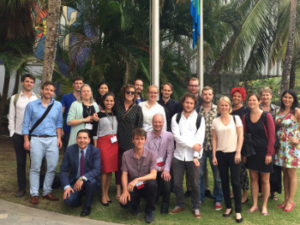Abstract submission deadline: 1 February 2017 (750 words max.)
When: Thursday, 25 May 2017, 9:00 – 17:00
Where: Hilton San Diego Bayfront, San Diego, CA
Organizers: Peter Van Aelst (U of Antwerp), in collaboration with Kimberly Gross (George Washington U), Thomas Zerback (LMU Munich), Sebastian Valenzuela (Pontifical Catholic U of Chile), and Claes de Vreese (U of Amsterdam)
What will your preconference be about?
This preconference is about YOU. There is no common subject, the starting point is your PhD research project.
Why should we have this conference?
This preconference contributes to building a new generation of political communication scholars. You improve your work, You learn about academia, You meet new people.
What do you envision to come from your preconference?
This preconference helps to build international networks of young scholars that share the same interests and are willing to cooperate.
Don’t believe me? Ask someone who participated before! Here are a few testimonials from PhD students from the last edition in 2015.
 “The pre-conference was super helpful for me in two ways. First, the advice I got on my project and for my future as an academic has been important. Second, the small setting meant that I got to know the participants well. In fact, every ICA I re-connect with the other students who were part of my cohort, and our diverse group is an awesome support system as we embark on our careers.”
“The pre-conference was super helpful for me in two ways. First, the advice I got on my project and for my future as an academic has been important. Second, the small setting meant that I got to know the participants well. In fact, every ICA I re-connect with the other students who were part of my cohort, and our diverse group is an awesome support system as we embark on our careers.”
Shannon McGregor (U of Texas)
“I will always fondly remember the political communication preconference for graduate students. It was a valuable experience during my PhD life. I not only received vital feedback on my PhD thesis from great peers, but I also met terrific PhD students from all around the world with whom I still keep in touch. Meeting them at conferences is always fun.”
Christiane Grill (U of Vienna)
“As a first-time ICA conference attendee, the Political Communication preconference provided the perfect setting for connecting with fellow young scholars and getting helpful feedback and tips for my project and the academic world in general. Definitely the best way to kick-off an ICA conference as a PhD student within this field!”
Kim Andersen (U of Southern Denmark)
“I really enjoyed my participation in the PhD Preconference. It provided me with an extensive introduction to academia in general and the field of political communication in particular. Moreover, presenting and discussing work with peers in a supportive environment enabled me to improve my own work whilst getting inspired by the research of others. The preconference’s schedule ensured that enough time was reserved for constructive feedback on each contributor his or her work. All in all, I can highly recommend the PhD preconference of Political Communication!”
Michael Hameleers (U of Amsterdam)
